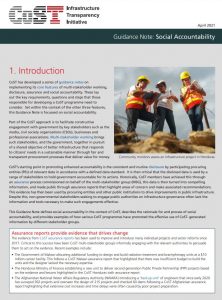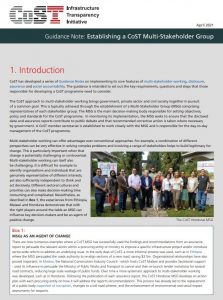CoST releases its final guidance on the CoST approach centred on improving the disclosure, multi-stakeholder working and social accountability features of its approach. This draws on our recent impact, lessons learned and adaptability during Covid-19. The guidance will help not only our members but others wishing to adopt the approach in infrastructure and across other sectors.
Disclosure guidance
 The robust Disclosure Manual released last month demonstrates how evolved the CoST disclosure journey has become, encouraging greater digitisation in data publication, essential to augmented transparency and accessibility and particularly important during Covid-19 lockdown.
The robust Disclosure Manual released last month demonstrates how evolved the CoST disclosure journey has become, encouraging greater digitisation in data publication, essential to augmented transparency and accessibility and particularly important during Covid-19 lockdown.
It explains the CoST Infrastructure Data Standard (CoST IDS) and the further advanced Open Contracting for Infrastructure Data Standard (OC4IDS) which enhances more structured technical data which can be freely used, re-used and redistributed by anyone. Facilitating the interoperability of data in this way not only helps to centralise data but when incorporated from multiple sources Infrastructure Analytical Dashboards can then be used to help highlight key issues. Accordingly, our guidance outlines the case for the OC4IDS and analytical dashboards, including the steps to take to implement these tools and important considerations such as increasing the dashboards’ optimisation through compelling visualisations.
The guidance outlines the best way to design a disclosure process, taking users through the fundamental questions to ask at the start of the process. Questions such as whether there is a clear basis to disclose data? What is being disclosed and how can it be improved? What mechanisms for stakeholder engagement encourage greater disclosure? It gives guidance on how to engage procuring entities when making a request for data publication and effective means of training procuring entities on data disclosure and how to scale up disclosure.
Read the Manual and Guidance Note.
Social accountability guidance
 The CoST social accountability feature helps ensure that the data disclosed and turned into compelling information during the assurance process is used by an array of actors. As the CoST approach has developed, the actors engaged have extended beyond media and civil society to include academia, trained infrastructure monitors and ordinary citizens.
The CoST social accountability feature helps ensure that the data disclosed and turned into compelling information during the assurance process is used by an array of actors. As the CoST approach has developed, the actors engaged have extended beyond media and civil society to include academia, trained infrastructure monitors and ordinary citizens.
Our guidance emphasises the tried and proven effective ways to heighten accountability in different contexts, outlining the importance of adapting approaches to best suit local conditions. In Honduras the programme has seen great success working with the countries 400 Citizen Transparency Commissions (CTCs) to train local communities to monitor infrastructure projects and provide feedback to the assurance process.
Practical steps include how to design a social accountability strategy, identifying the audience, tools and messages to engage stakeholders and monitor progress throughout its delivery. Useful tips on training different actors are also provided.
Read the Guidance Note.
Multi-Stakeholder working guidance
 Multi-stakeholder working offers many advantages over conventional approaches, with different perspectives helping to solve complex problems. It has contributed to CoST impact such as in Ethiopia where the Multi-Stakeholder Group (MSG) persuaded the roads authority to re-align sections of a new road, saving $3.5 million in the process or in Honduras where the MSG developed an action plan which helped to replace a public body suspected of corruption.
Multi-stakeholder working offers many advantages over conventional approaches, with different perspectives helping to solve complex problems. It has contributed to CoST impact such as in Ethiopia where the Multi-Stakeholder Group (MSG) persuaded the roads authority to re-align sections of a new road, saving $3.5 million in the process or in Honduras where the MSG developed an action plan which helped to replace a public body suspected of corruption.
Multi-stakeholder working however comes with challenges, bringing different sectoral cultures and priorities together can make decision-making time consuming and complicated. The guidance outlines six core steps to form and see that an MSG works efficiently in a group and with the secretariat of a CoST member programme.
Beginning with the group formation, we look at the most appropriate stakeholder members to engage. In ensuring good MSG composition the guidance details how to ensure equal voice among members and diversity through greater female inclusion, as well as a fair nomination process.
Other key aspects to ensure good governance on the MSG include developing a Terms of Reference and a Code of Conduct with useful templates provided for CoST members and others to adapt and use. The guidance also details the different options available to establish the legal basis for the MSG to operate, drawing on our experience of the pros and cons of the various options our members have used. It concludes by highlighting ways of amplifying impact and well-functioning internal and external relationships by outlining the role of a CoST champion on an MSG and clarity on MSG responsibilities and the relationship between the member secretariat and MSG.
Read the Guidance Note.
What’s next?
Throughout the year we will continue to deliver guidance to help respond to pressing global issues. Our next guidance will look at enhancing gender inclusion across our members and in their activities.
